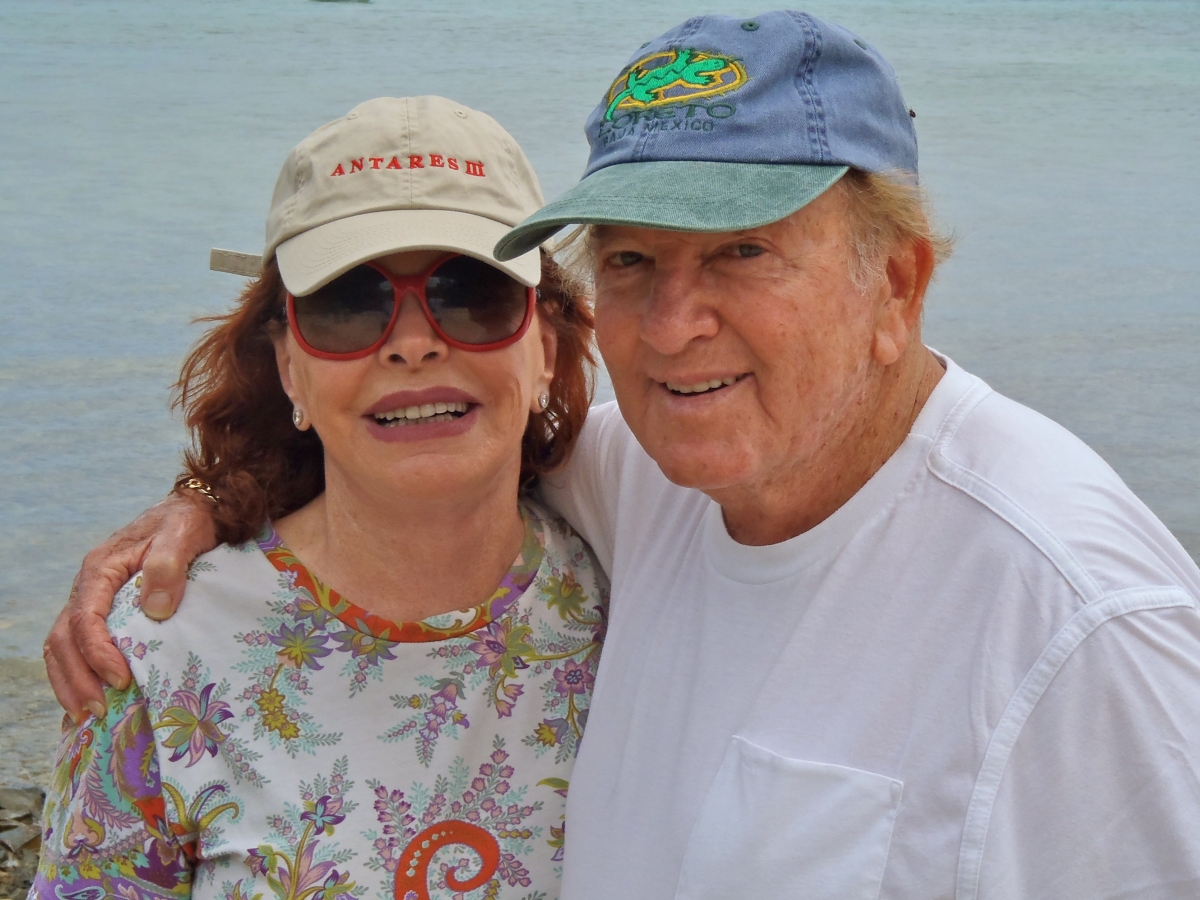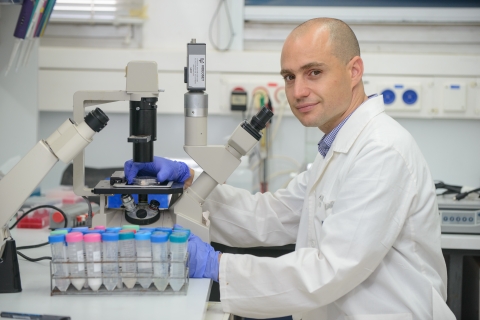Morris Kahn
Serial entrepreneur, serial philanthropist
People behind the science

Morris Kahn may be best known in Israel as the founder of Amdocs, one of Israel’s largest, most established high-tech companies with 26,000 employees worldwide, and the founder of Coral World, which operates the underwater observatory in Eilat.
But his spirit is more serial entrepreneur than CEO, and he enjoys recounting with some humor his most low-tech ventures, including a bicycle factory in Bet Shemesh and a cattle company in the Northern Galilee. Today, just before he turns 86, he is a serial philanthropist with a deep concern for the environment, science, and a healthy and productive and democratic Israeli society.
A major donor to the Weizmann Institute of Science, Mr. Kahn helped launch the field of systems biology with a multi-million dollar gift in 2005. The Institute quickly became a world leader in this nascent field, which fuses physics and biology to create a holistic understanding of how the structure of our biology is closely intertwined with its function. Recently, he established the Morris Kahn Institute for Human Immunology at the Weizmann Institute with another significant gift. The Institute will fund the work of a range of studies in this field, in which the Weizmann Institute is a world-renowned leader (see sidebar).
“I’m very interested in understanding the mechanisms by which the body protects itself against disease,” says Mr. Kahn. “When I invest, it is not only in the concept but in the people. There is a critical mass of immunology talent at Weizmann - a real powerhouse of outstanding individuals.”
He grew up in South Africa, and in 1948, Morris joined the Habonim youth movement. He wanted to come to Israel but was encouraged by the movement’s counselors to wait since he was still young. “I was becoming aware of the social problems in South Africa and decided that I wanted to move to Israel,” he says.
After getting married to Jackie, he opened bicycle and jewelry stores. “I created my retirement plan: I developed a building in Welkom, South Africa, and figured that I could retire on the rent, providing I lived modestly. My plan was to retire by the beach by the age 26. I haven’t stopped working since,” he jokes. In 1956, the family moved to Israel with their two sons, David and Benjie, who were 3 and 1.5 years old.
They settled in Bet Yannay, a moshav near Netanya, which had about 40 families. He bought a truck and spent a year transporting chickens and citrus to the markets, and then set up a bike factory with Kibbutz Tzora near Bet Shemesh. “It was my first real lesson in doing business in Israel in the early years,” he says.
“I was supported throughout the years by Jackie, who passed away from a long illness, and I have been fortunate in meeting my partner, Ariella Delaney, who has been my source of constant support and very helpful with my philanthropy, especially with the Weizmann Institute.”
Deeply committed: the joys of diving and giving
While Amdocs was the source of his fortune, Morris is much more eager to talk about his various philanthropic ventures and two of his life’s passions - deep sea diving and sailing.
He began scuba diving with his family in Eilat in the late 1960s. He perforated an eardrum when he dove too deep, which gave him pause and caused him to think about about the prospect of not diving, though he dives to this day. “I realized that most people don’t get a chance to see the beautiful underwater world - the coral and the fish - because they don’t dive,” he says. So in 1972 he began the construction of the Underwater Observatory and Marine Park in Eilat. Since its opening in 1974 (its construction was put on hold during the Yom Kippur War), it has welcomed about 400,000 visitors per year.
Witnessing its immediate success, he established Coral World, a company that operates a series of similar underwater observatories and aquariums around the world, in Maui, Hawaii; Perth, Australia; and Palma de Mallorca in Spain. His son Benjamin has taken over Coral World’s operation. In 2014, the underwater observatory in Eilat built a shark tank that attracts tourists from Israel and around the world.
In addition to giving generously to a wide variety of organizations, mostly in Israel, he established two other organizations: LEAD, a nonprofit that nurtures leadership skills among young Israelis, and the Therapeutic Riding Center of Israel, which aims to improve the lives of people with disabilities through therapeutic riding and dog therapy.
“There are a lot of things that need doing - so many things that we can do to make this a better society and a better country,” he says.
He is also one of the investors in Time to Know, a nonprofit whose mission is to leverage education technology to offer an empowering and meaningful experience to learners and educators worldwide.
He is a donor and a public board member of Space IL, Israel’s nonprofit initiative to land an unmanned spacecraft on the Moon as part of the Google Lunar X Prize. SpaceIL was founded by three Israeli aerospace engineers in 2010. “Landing a robot on the Moon is very complex but I enjoy being involved in the challenge,” he says. “I am a great believer in education and one of our goals at Space IL is getting the young generation excited and educated about science and space. We are trying to create the effect that Apollo had on the young generation in the U.S. I think it would be important for Israel to succeed in a competition like this. It would put Israel on the map in Space.”
Mr. Kahn was introduced to the Weizmann Institute about a decade ago by a friend who attended a lecture by Prof. Uri Alon of the Department of Molecular Cell Biology. He was deeply impressed.
“Uri’s group became a world-class group, and I’m proud of having financed it from the beginning,” he says. That major visionary gift built the foundations of the field and attracted additional donors to the area. Prof. Modi Segal, a member of the International Board of the Weizmann Institute, also gave funding to Prof. Alon’s systems biology initiative. And in 2011, the Azrieli Institute for Systems Biology, headed by Prof. Naama Barkai of the Department of Molecular Genetics, was founded with a gift from the Azrieli family of Israel and Canada.
Mr. Kahn follows science with intensity. His recent gift in immunology reflects his increasing attention to this area, and, he adds, “We must have a better understanding of immunology. I believe that this is ‘where it is at’ in terms of solving many diseases.”

Morris Kahn and Ariella Delaney
The Morris Kahn Institute for Human Immunology
The Weizmann Institute has historically been a world leader in immunology, starting with the groundbreaking work of Prof. Michael Sela and Prof. Ruth Arnon and the late Dr. Dvora Teitelbaum that led to the blockbuster drug Copaxone® for the treatment of multiple sclerosis. Another example is Prof. Zelig Eshhar of the Department of Immunology, whose innovative work in immunotherapy for cancer won him the Israel Prize in 2015; the therapy based on his discoveries is showing highly promising results in clinical trials.
Building on a history of achivements in this area, the Kahn Institute, which will be headed by Prof. Michal Neeman as Vice President of the Weizmann Institute, will advance the reesarch of Dr. Ziv Shulman of the Department of Immunology and collaborations around his work, in addition to a wide array of projects in this area. Dr. Shulman, who joined the Department of Immunology in 2015 after a postdoctoral fellowship at Rockefeller University, is investigating the molecular interaction of the antibody-producing cells in the body’s lymph nodes.
Forming efficient antibiodies against specific pathogens involves a biological process called “affinity maturation” in which random mutations are introduced into B-cell antibody genes. Dr. Shulman has studied how T and B cells interact with one another during a critical period following infection in order to prepare the best antibodies and establish long-lasting protection. In order to understand the cellular dynamics of this process, he developed a system for direct visualization and quantification of the antibody selection process in living mice by using two-photon laser scanning microscopy and highthroughput computerized analysis.
He has since made multiple discoveries about how these cells interact, creating a clearer picture of the antibody affinity maturation process and shedding new light on the process of acquired immunity.
Other avenues of research include:
The molecular and cellular mechanisms that control immune tolerance, a process in which the immune system “learns” to recognize and tolerate the body’s own components—with implications for multiple sclerosis and other autoimmune disorders (Dr. Kobi Abramson).
The mechanisms by which white blood cells exit blood vessels at specific sites of inflammation and injury, with implications for autoimmune diseases and of novel anti-inflammatory therapies for smokers at high risk of chronic inflammatory pulmonary obstruction (Prof. Ronen Alon).
The gastrointestinal tract and microflora, a diverse ecosystem that contains trillions of bacteria, viruses, fungi and parasites—which has implications for Inflammatory Bowel Disease, diabetes, obesity, and autoimmune disorders (Dr. Eran Elinav).
How immune system cells communicate while coordinating an immune response, with implications for cancer and Type 1 diabetes. (Prof. Nir Friedman). The homing process by which immune cells reach inflammation sites in the body (Prof. Idit Shachar)


Dr. Ziv Shulman








